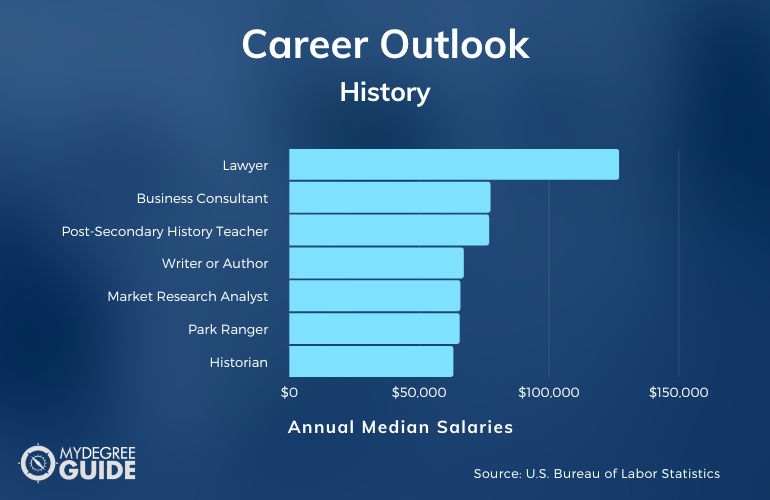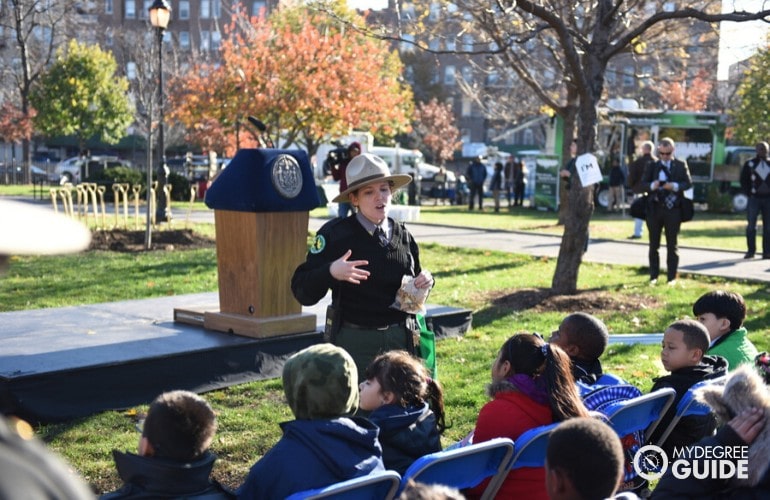What can you do with a history degree? While some people go the literal route and become historians, there are many other career possibilities in law, education, journalism, business, and even politics.

Editorial Listing ShortCode:
It’s just a matter of figuring out what you want to do.
10 Things You Can Do With a History Degree
1. Historian

The most obvious path for a history major is to become a historian. It can require a lot of reading, writing and researching, but if you enjoy treasure hunts for lost documents and scholarly arguments over the legitimacy of texts and artifacts, it may be an exciting career as well.
Broadly speaking, there are three focus areas for historians:
- Region
- Time period
- Theme
You could study a specific country or a specific century, or you could follow a special topic throughout the ages. For example, you could track the spread of a disease across the world, or you could investigate the origins of a folk hero or the expansion of a royal family tree.
If you don’t want to spend all of your time hunched over a desk, you can also dabble in other ventures such as writing books, touring museums or giving lectures at universities. Your career as a historian can be as vibrant as you want to make it.
2. Educator

According to the American Historical Association, education is the most common field for history majors. More than 18 percent of graduates go into teaching, training or researching for history departments and programs.
Your experience as an educator will depend on both your own level of schooling and the level of schooling that you want to teach. For example, the market is much more competitive for college-level history professors than middle and high school history teachers.
The pay is typically better, but the applicants are expected to be more qualified. You might need a master’s degree or higher for the really lucrative teaching jobs.
If you love sharing your passion with the world, however, a career in education may be a great avenue for your knowledge and enthusiasm. You might even inspire the next generation of history buffs.
3. Curator/Archivist

Curating and archiving are two separate things, and you can find different jobs for them, but there’s so much crossover in their skills, workplaces and degree programs that they’re often discussed together when talking about careers.
Individually, here’s what curators and archivists do:
- Curators manage the collections of museums and cultural institutions.
- Archivists manage their records and other materials.
Both jobs are dedicated to the preservation of historical documents and artifacts, which is why there’s so much overlap between them. Some curators even double as archivists or vice versa. Their career paths are closely entwined.
4. Lawyer

You might be surprised to learn that history majors can become lawyers, but it’s actually quite common. The shared thread is research.
Traditional or online history degree programs spend a lot of time finding, collecting, interpreting and analyzing texts. They learn to hone their skills in fact checking and investigating, and they become adept at things like summarizing documents, writing proposals and cross-referencing textbooks.
Lawyers need the same skills for their work, and so do paralegals and legal assistants. Additionally, since you can apply to law school with any bachelor’s degree, a history degree often works just fine as a prerequisite. It’s something to consider if you’re interested in both history and law.
5. Writer

Many history degree programs have a writing element to them. Aside from general essays and assignments, there are also special classes devoted to things like grant writing and technical writing.
These classes are meant to prepare you for a potential career in academia, but they can also help you strengthen your skills as a writer in general. You may take what you’ve learned and apply it to a job as an author, editor, archivist, researcher or publishing agent.
You don’t even have to be a full-time writer. Many teachers and researchers take on side jobs as experts in their field, or they have passion projects in the form of essays, books, proposals or research projects that they want to share with the world. Writing skills can be critical for these interest areas.
6. Journalist

This is another field where you can utilize the reading and writing skills that you learn as a history major. Since you should be accustomed to research, you should be able to dive right into the minutiae of the latest big story.
A journalism career can also be connected to cultural or political work. For example, if you’ve studied the history of a region overseas, you may be able to take that knowledge and apply it to everything from news reports to international policies.
“Journalist” might not be the first career that you think of when you’re studying history, but it may be a valid option for those with strong writing skills and a love of research. Give it some thought if you’re looking for unique careers that can make use of your history degree.
7. Tour Guide

If you’re looking for entry-level jobs with a history degree, consider becoming a tour guide. They’re needed everywhere from museums to visitor’s centers to cultural heritage sites, and they can combine your love of history with a fun, people-oriented job.
Most tour guides are privately employed by museums and galleries. Others might work for the government, especially if they’re with the National Park Service. Did you know that you can pursue a job as a park ranger with a history degree?
It’s a lesser-known career path, but some history majors fall in love with monuments, battlegrounds, indigenous lands or other sites of historical significance, and they work as park rangers so that they can give tours of the area and share its story with visitors.
Don’t be afraid to think outside of the box with your history degree. There are many trajectories that your career can take.
8. Translator/Interpreter

Do you speak another language? Do you enjoy learning about different cultures or connecting people from different backgrounds? You might be interested in a career as a translator or interpreter.
Some people get into this field as a natural extension of their historical work. If you’re studying imperial Japan, for example, you might find yourself learning the Japanese language, and that can qualify you to work as a Japanese translator.
Other people get into translating due to social or political jobs, or they want translating as a marketable skill on their resume even as they study history for fun.
There are many possibilities for history students who are interested in languages, so if this describes you, don’t hesitate to explore your options.
9. Librarian

Librarians do a lot more than just checking out books for visitors. Depending on the specifics of your position, you might spend your days researching, archiving or writing for scholarly journals. You might organize historical documents or verify historical texts for accuracy and legitimacy. Librarians wear many different hats.
Many librarians also work on public outreach programs for educational purposes, so if you’re the creative type, that might be a good way to channel some of your skills.
Just know that that library and information science is its own discipline, so a history degree might not be enough to get a job in this field. However, it may be a strong foundation for a certification or post-graduate degree in library science. If you want to combine your love of books with your love of history, this might be a good career path for you.
10. Politician

Many politicians have been history majors, including Winston Churchill, Theodore Roosevelt, John F. Kennedy and Dwight D. Eisenhower. It’s a common degree track for those who are curious about the intersection of law, history and political science.
Your research skills can help you in a political job. So can your writing and debating skills. If you’re running for office, it’s also a good idea to be versed in American history, and a history degree program can help with that.
Politics is another field that might not immediately come to mind when you’re thinking about history degrees, but as you can see, it makes sense. Even more importantly, it can be useful for your future job.
History Careers and Salaries

Jobs are on the rise for history majors. Historians are are expected to grow at a rate of 3 percent, and curators and archivists are expected to grow at a rate of 11 percent. Teachers are expected to grow between 4 – 9 percent.
Of course, these aren’t the only jobs that you can get with a traditional or accelerated history degree.
Typical Employers for History Majors

Every industry is different, and there’s no particular company where you’ll be guaranteed a job just because you have a history degree. However, there are a few places where a history degree can be an asset.
- Historical societies and associations
- Colleges and universities
- Museums
- Art galleries
- Cultural centers
- National parks and reserves
- Libraries
- Visitor centers
- Historical sites
- Memorial centers
Additionally, many of these categories can be broken down into sub-categories. For example, “museums” can include art museums, science museums, historical museums, heritage museums and living history museums.
Entry-Level History Jobs

According to the Bureau of Labor Statistics, historians earn on average $63,100 per year, but they usually need a master’s degree to get anywhere. What if you’re looking for something simpler? What are your options for entry-level jobs? Here are some potential jobs and their average salaries you could pursue:
- Park Ranger ($65,540)
- Paralegal ($52,920)
- Journalist ($49,300)
- Tour Guide ($29,460)
Just keep in mind that salaries can fluctuate. People working the same job can make different amounts of money depending on things like education, experience, location and demand.
Mid-Career History Jobs

While entry-level jobs might only ask for an associate degree, mid-level jobs are a bit more competitive. They might require a bachelor’s degree or state licensure, or you might have to have several years of experience in the field before you can work your way up. According to the Bureau of Labor Statistics, some of the careers and their average salaries that are included:
- Market Research Analyst ($65,810)
- High School History Teacher ($62,870)
- Librarian ($60,820)
- Translator or Interpreter ($52,330)
- Archivist, Curator or Museum Worker ($52,140)
- Graduate Teaching Assistant ($36,250)
Again, however, these numbers are just an average. You should look at the salaries in your particular state to get an idea of what you can earn in your chosen career.
Highest Paying History Jobs

The highest-paying jobs for history majors usually require advanced degrees or certifications. There are exceptions, of course, but speaking very generally, you should be prepared to put in long hours of work for these occupations. Here are some of these jobs and their average salaries:
- Lawyer ($126,930)
- Business Consultant ($77,420)
- Post-Secondary History Teacher ($76,890)
- Writer or Author ($67,120)
- Historian ($63,100)
Salary differences can be especially noticeable in high-paying careers. For example, the Bureau of Labor Statistics reports that college history professors in Rhode Island can take home as much as $112,740 on average per year while college history professors in North Texas Region of Texas, nonmetropolitan area, only make an average of $31,940 per year. It’s definitely something that you should research further.
Professional Organizations and Networks for History Majors

Professional organizations can offer a lot of support to history majors. They may provide everything from academic resources to networking opportunities between students and employers, so they’re worth considering if you want to get a leg up in your field.
- American Alliance of Museums: The AAM is a nonprofit association dedicated to museums, and its student membership has scholarships, fellowships and internships for degree seekers.
- American Historical Association: Founded in 1884, the AHA is one of the oldest historical groups in the country, and it offers many different resources for both students and professionals. Members can enjoy everything from webinars to job boards.
- American Library Association: Though it’s dedicated to library science, the ALA can also be a valuable resource for history majors, especially those who are interested in non-history career paths. Membership is open to anyone who is interested in library science.
- Independent Curators International: The ICI produces a variety of events, exhibits and scholarly articles that might be of interest to history students, and like their name suggests, they’re a fully independent organization.
- National Council on Public History: “Public history” usually refers to history that’s taught or researched outside of traditional academic settings, and the NCPH is at the center of it. They offer awards, journals, conferences and more.
- National Emerging Museum Professionals Network: The NEMPN is a multi-discipline, multi-cultural network that brings together students and professionals from many different fields, and it offers a wealth of resources for its community.
- Organization of American Historians: Dedicated to American history, the OAH is the largest organization of its kind, and it has special membership rates for students.
- The World History Association: The WHA organizes a variety of events and publications for historians, including panels, conferences, newsletters and academic journals such as The Journal of World History and The World History Bulletin.
- American Association of State and Local History: Another organization devoted to public history, the AASLH offers support for individuals, museums, businesses and historical programs.
These are just a few organizations that welcome history majors. For more ideas, get in touch with an advisor at your chosen school.
What Can You Do With A History Major?

A history degree can qualify you for many different jobs. The most obvious option is becoming a historian, but you could also look into jobs as a teacher, curator, archivist or museum docent.
Do you like working with people? Consider pursuing a job as a tour guide that takes visitors around memorials or famous historical sites. Do you prefer to work behind a desk? Consider becoming a writer or researcher for a special historical topic.
You might also consider non-history jobs that can still make use of the skills that you learned as a history student. Lawyers or even graduates with an online military history degree, for example, do a lot of researching, and politicians can draw on history to make decisions and formulate campaigns.
Is A History Degree Useless?

A history degree is far from useless. It only gets that reputation because it’s a humanities degree as opposed to a technical or vocational degree. Some people argue that you won’t be able to make any money without specialized skills for the current job market.
Despite this, history students are making more money than certain other college graduates, and they’re enjoying a lower unemployment rate as well.
According to research analysis from American Community Survey, history majors made less than business majors but more than life sciences majors, and their unemployment rate was only 4.6 percent. This was much better than the national unemployment rate of 7.7 percent at the time of the analysis.
Additionally, the industry is on the rise. Thousands of jobs expected to open up in museums, colleges and libraries within the next decade, and with the right credentials, history majors can qualify for them. It’s may be a great time to get a history degree.
Is A History Major Worth It?

The value of a history degree depends on what you want to do with it. Some jobs pay more than others, and some markets are more competitive than others. For example, you’ll need a master’s degree to work as a college history professor, but a bachelor’s degree and a state license is usually good enough for high school history teachers.
If you’re going into a non-history field, you might need other degrees or certificates as well. One notable example is becoming a librarian. Most employers will want a degree in library science or information systems, so while a history degree can be a good starting point for you, it probably isn’t the ending point.
You should think about all of these things before choosing a college program.
What Is The Highest Paying Job With A History Degree?

University professors usually get the highest return on investment for their history degree. They can potentially earn more than $100,000 per year in certain states (Bureau of Labor Statistics).
If you include other fields where history majors can thrive, the paydays can grow even more impressive. Lawyers can potentially make millions. Politicians can potentially make six figures or more. Writers may get huge book deals, and business people may climb the corporate ladder until they’re CEOs.
However, it’s difficult to say which career path is the most profitable for a history major. There are just too many factors to consider overall.
How Long Does it Take to Get a History Degree?

The time that you spend in school will depend on the degree that you’re trying to get. The averages look a little something like this:
- Associate degree: two years
- Bachelor’s degree: four years
- Master’s degree: two years
- Doctorate degree: anywhere from 4 – 8 years
Your exact timetable will depend on your school, course load, degree program and acceleration options. For example, if you’re aiming for a master’s degree in history, you can sign up for a dual degree program that will allow you to finish in five years instead of six.
You can also take summer classes or night classes to increase your number of credits per semester.
Getting Your History Degree Online

While it’s true that a history degree isn’t for everyone, it’s much more valuable than some people think. You can take a history degree and leverage it into opportunities in a variety of industries.
It’ll be a good investment for the future, especially if you’re passionate about the subject.
